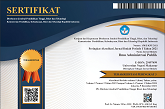Implementation of Entrepreneurial Government in Makassar City Government
(1) Department of Public Administration, Universitas Negeri Makassar
(2) Department of Sociology, Universitas Negeri Makassar
(3) Department of Sociology, Universitas Negeri Makassar
(*) Corresponding Author
DOI: https://doi.org/10.26858/jiap.v11i2.30201
Abstract
The concept of entrepreneurship in the government sector is very important and strategic to be input into the mindset and culture set of the state government apparatus. That is, the fundamental point is to organize the orientation of the government apparatus to be more adaptive, responsive, creative, innovative, professional, and visionary, to serve and capture every opportunity. The entrepreneurial spirit of government in the public sector is an ideal concept in the context of utilizing resources to improve the quality of public services and public trust more efficiently, effectively and more productively. However, it should be realized that even though the government adopts the principles of the private sector, the government's orientation is non-profit but to serve. This paper attempts to articulate how to implement entrepreneurship government in the Makassar City Government.
Keywords
Full Text:
PDFReferences
AM, E. N., Affandi, A., Udobong, A., & Sarwani, S. (2020). Implementation of Human Resource Management in the Adaptation Period for New Habits. International Journal of Educational Administration, Management, and Leadership, 19–26.
Andi, A., Akib, H., Anshari, A., & Yahya, M. (2018). Officialdom services innovation based mobile Sicakep in Wajo Regency (South Sulawesi, Indonesia). Espacios, 39(50).
Barney, J. B., & Wright, P. M. (1998). On becoming a strategic partner: The role of human resources in gaining competitive advantage. Human Resource Management: Published in Cooperation with the School of Business Administration, The University of Michigan and in Alliance with the Society of Human Resources Management, 37(1), 31–46.
Campbell, B. A., Coff, R., & Kryscynski, D. (2012). Rethinking sustained competitive advantage from human capital. Academy of Management Review, 37(3), 376–395. https://doi.org/10.5465/amr.2010.0276
Coccia, M. (2015). General sources of general purpose technologies in complex societies: Theory of global leadership-driven innovation, warfare and human development. Technology in Society, 42, 199–226. https://doi.org/https://doi.org/10.1016/j.techsoc.2015.05.008
Haryono, U. S., Akib, H., Rifdan, Sjarief, E., & Paraga, S. (2019). Decision stipulation on national air space zone of the republic of Indonesia. Journal of Legal, Ethical and Regulatory Issues, 22(2).
Junus, D., Akib, H., Suratman, & Tahir, H. (2016). The Recruitment system for civil servants from the perspective of developing organizational capacity in regional government. Social Sciences (Pakistan), 11(24). https://doi.org/10.3923/sscience.2016.5859.5863
Le Blanc, D. P. (1996). Quality and excellence in human services: (A volume in the Wiley series on clinical psychology) Paul Dickens, John Wiley & Sons Ltd., Chichester, 205 pp.; £14.95. Patient Education and Counseling, 27(2), 207–208. https://doi.org/https://doi.org/10.1016/S0738-3991(96)90003-8
Limpo, H. Y., Akib, H., & Dirawan, G. D. (2015). Policy formulation for the initiative right of people’s representative councilof South Sulawesi. International Journal of Applied Business and Economic Research, 13(4).
Miles, M. B., Huberman, A. M., & Saldana, J. (2014). Qualitative data analysis: A method sourcebook. In CA, US: Sage Publications.
Smith, A., & Akib, H. (2015). The Implementation Effectiveness of Trash Management in Ambon, Maluku: The Influence of Socialization, Coordination and Control to the Effectiveness of Trash Management. International Journal of Public Administration, 38(10). https://doi.org/10.1080/01900692.2014.908214
Souisa, W., Musa, C. I., Akib, H., Anshari, & Bado, B. (2019). Determinats of the performance of cooperative manager in ambon city, indonesia. Journal of Entrepreneurship Education, 22(1).
Syam, A., Hasbiah, S., Yunus, M., & Akib, H. (2018). Determinants of entrepreneurship motivation for students at educational institution and education personnel in Indonesia. Journal of Entrepreneurship Education, 21(2).
Wright, P. M., McMahan, G. C., & McWilliams, A. (1994). Human resources and sustained competitive advantage: a resource-based perspective. The International Journal of Human Resource Management, 5(2), 301–326. https://doi.org/10.1080/09585199400000020
Zaugg, R., & Thom, N. (2002). Excellence through implicit competencies: Human resource management–organisational development–knowledge creation. Journal of Change Management, 3(3), 199–211. https://doi.org/10.1080/714042541
Article Metrics
Abstract view : 198 times | PDF view : 46 timesRefbacks
- There are currently no refbacks.
Copyright (c) 2022 Muhammad Aris, Andi Agustang, Andi Muhammad Idkhan

This work is licensed under a Creative Commons Attribution 4.0 International License.
Diterbitkan oleh:
Program Studi Ilmu Administrasi Publik
Program Pascasarjana Universitas Negeri Makassar
JIAP Index By:

This work is licensed under a Creative Commons Attribution 4.0 International License.









